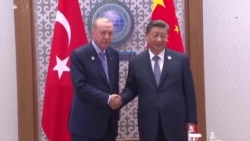Why China’s improving relations with Turkey have the Uyghur community concerned.
Welcome to VOA Asia Weekly. I'm Chris Casquejo in Washington. That story is just ahead, but first, making headlines:
Myanmar’s junta extended the state of emergency by six months. This decision delays the elections it had promised to hold as clashes with opposition forces continue.
Bangladesh on Thursday banned the Jamaat-e-Islami party, its student wing, and other related groups, calling the party a “militant and terrorist" organization. It’s part of a nationwide crackdown following weeks of violence that left more than 200 people dead and thousands injured.
Hundreds of rescue workers and soldiers are searching for survivors of monsoon landslides in southern India. Heavy rain triggered torrents of mud and water, causing multiple landslides that swept through villages in Kerala, a popular tourist destination. State officials said at least 192 people were killed and more than 8,300 have been moved to relief camps.
The U.S. announced $500 million in military funding to the Philippines on Tuesday to help modernize its armed forces. U.S. Secretary of State Antony Blinken and Secretary of Defense Lloyd Austin reinforced the U.S. commitment to “upholding international law in the South China Sea” when they met with Philippines President Ferdinand Marcos Jr. In response, a Chinese Foreign Ministry spokesperson said that the U.S. is not a party to the South China Sea and has no right to intervene.
Indonesian President-elect Prabowo Subianto met with Russian President Vladimir Putin in Moscow on Wednesday to strengthen ties with Russia, which he called a “great friend.” Prabowo also expressed his interest in continuing partnerships in defense, energy, and sending Indonesian students to Russia to study medicine.
China's BYD plans to build a billion-dollar factory in Turkey, signaling a shift in relations after years of tension over Turkey's support for Uyghur minorities. VOA’s Dorian Jones reports from Istanbul on how the countries are finding new common ground economically and diplomatically.
July saw China's BYD car giant sign an agreement to build a billion-dollar factory in Turkey. The factory will produce 150,000 vehicles annually, mainly for the European Union market.
Analysts say the deal marks a turning point in Turkish-Chinese relations.
“This deal has the potential to reduce the trade imbalance, the trade deficit, which is a detriment to Turkey. And on the other hand, for China, (it) is also important because the products produced here will be exempt from tariffs.”
Analysts say the planned factory is a way to avoid the EU’s new tariffs on Chinese vehicles, and they say the new investment is also a sign of a shift in Beijing's policy after years of avoiding investing in Turkey.
“China perceives Turkey as a high political risk country in the region.”
But that is changing, and some in the Uyghur community are worried that Turkey may be turning on them.
Ankara has been critical of Beijing’s crackdown on its predominantly Muslim Uyghur minority and has offered refuge to many. Observers say Uyghur dissidents fear Beijing's billion-dollar investment in Turkey could be part of a deal struck during Turkish Foreign Minister Hakan Fidan's recent visit to China.
“There are rumors the Chinese side is pressing for the ratification of this extradition agreement, that they would want Uyghurs in Turkey, some of them at least, to be returned to China to be tried in China, etc.”
Others suggest China's pivot towards Turkey, a NATO member, could be part of Beijing's increasing competition for global influence, especially with the United States.
Analysts say that Ankara and Beijing are finding increasing diplomatic common ground, including criticism of Israel's war on Hamas.
“If you take, for instance, the Gaza issue right now, Turkey and China, and even without trying, they see eye to eye on this issue; their foreign policies align.”
Ankara welcomed Beijing's hosting of Palestinian leaders this month. Israel’s war is threatening to escalate, and observers say that can only provide more common ground between Ankara and Beijing.
Dorian Jones, VOA News, Istanbul.
Visit voanews.com for the most up-to-date stories.
I’m Chris Casquejo.
Finally, a big day for some cosplayers!
The annual Hong Kong Ani-Com and Games is back. Hundreds of cosplayers brought their favorite manga and game characters to life.
Thanks for watching VOA Asia Weekly.











